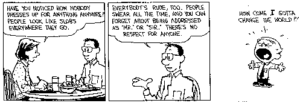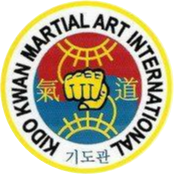A PLAIN ENGLISH EXPLANATION OF THE ITF STUDENT OATH
(with help from Calvin and Hobbes)
ESSAY SUBMITTED BY: GRANT ECCLES
The Student Oath is as much a part of Tae Kwon Do training as warming up and stretching, patterns, sparring and all the other facets of the art that the student is encouraged (and required) to gain a good understanding of as they make their way through the grades. Many students however, from seniors to juniors, are unable to provide when asked more than a faltering explanation of the different lines of the student oath. The purpose of this essay is to provide a plain English explanation of what the author considers to be the meaning of each line of the oath, with the aim of creating a document that can be used by instructors and students alike to fully understand what each ITF member recites at the start of training.
I SHALL OBSERVE THE TENANTS OF TAE KWON DO.
This opening line of the oath instructs the student to give effect to the five tenants of tae kwon do in their behavior both within and outside the dojang. The tenants and their meanings are (briefly):
i) Courtesy
Maintaining good manners and appropriate etiquette at all times.
ii) Integrity
Knowing right from wrong, and having a guilty conscience when Knowingly doing wrong
iii) Perseverance
To try, try, and try again until a satisfactory outcome results.
iv) Self-Control
At all times to have control over one’s thoughts and actions.
v) Indomitable Spirit
Having the spirit, or “guts”, to stand up for something you believe in even if many people oppose you. More specifically to physical training, is the willingness and attitude to constantly push your limits through training and performing with 100 % effort and commitment.
I SHALL RESPECT THE INSTRUCTOR AND SENIORS.
This line at first glance requires the briefest explanation but has many connotations. Respect for the instructor(s) and seniors is crucial if a dojang is to have a good training atmosphere and truly successful students. Showing respect, however, entails more than just bowing to the seniors when arriving at training and calling them sir or ma’am as the case may be. A respectful student will appreciate the time and effort that the instructor and seniors are giving to the class and will respond by training with 100 percent effort and commitment. Respect also entails recognizing the limitations that an instructor may have in terms of physical prowess or availability of equipment
This line of the oath should not be misunderstood as meaning that should a student become a senior and/or instructor they do not need to show the same level of respect to those who are below them in terms of rank. The responsibility lies with the instructor and seniors to ensure their actions are worthy of respect by their juniors, both within and outside the dojang.
The thing to remember about this line of the oath is that respect must be earned, and that once earned, respect breeds respect.
I SHALL NEVER MISUSE TAE KWON DO
Tae Kwon Do, given its most basic definition, is a version of unarmed self-defense. When seen in this light the meaning of the above line of the oath is obvious to most students, that is, Tae Kwon Do skills should never be used in an act of unprovoked (or for that matter provoked) aggression. Physical tae kwon do skills should be used as a last resort to repel an attacker when all other less violent attempts have failed. Attempts at provocation should be ignored by the student in a display of self-control.
Tae kwon do can also be misused in other ways. General Choi Hong Hi (1991, 47) states that “tae kwon do shall never be used for any commercial or political purpose whatsoever”. The instructor who uses Tae Kwon Do training solely to gain revenue from his students, without considering their welfare or standards, is seriously misusing Tae Kwon Do. According to Choi (1991, 44) “An instructor should not exploit his students. The only purpose of an instructor is to produce both technically and mentally excellent students”.
SHALL BE A CHAMPION OF FREEDOM AND JUSTICE
Many students may wonder how this line of the oath can relate to them as they go about their day-to-day lives, as the line conjures up images of people fighting for noble causes or defending the rights of someone accused of a crime. In many small ways, however, the average tae kwon do practitioner can be a champion of freedom and justice.
Perhaps the easiest way for a tae kwon do student to give effect to this line of the oath is to adopt an open and receptive mind as they go about their lives. For example, people are often quick to prejudge others who appear different or who live lifestyles different to themselves. A champion of freedom and justice would retain an open mind on such matters and realize that what counts in a person is their actions and words rather than their appearance or lifestyle. In essence, if a tae kwon do student lived by the maxim of “not judging a book by its cover”, they would be giving effect to this line of the student oath.
Justice is done when a true or “just” result is gained from a situation. This can only be achieved when all the facts relevant to the issue/situation are known, and a decision is made according to those facts. Thus in any argument, case or issue the tae kwon do practitioner should seek to first avail themselves of the facts before deciding on what the most just result is. By adopting such an attitude, and not jumping to conclusions, one would be a champion of justice. Examples of such situations are a teacher trying to resolve a quarrel between two students, or a manager attempting to resolve a dispute between two employees.
I SHALL BUILD A MORE PEACEFUL WORLD
This line instructs the tae kwon do student to go about their life in a manner that promotes peace and harmony. If every person in the world strove to live their life in such a manner. Then the world would undoubtedly be a less violent Place.
Some students confuse the intent of this line and consider that it instructs them to back down from aggression. This is not the case, because the art of tae kwon does teach a student unarmed self-defense. Every student is entitled to defend themselves effectively against unprovoked aggression, and would not be offending the intent of this line of the oath and the art of tae kwon do by doing so. Should a student deliberately provoke aggression toward them, however, they would not be giving effect to the above line.
Good examples of this are famous military and civil leaders of the nation of Korea, who in nearly five thousand years of Korean history have never invaded their neighbor yet who have fought bravely and made great self-sacrifices to defend their homeland against invading enemies (Choi 1991, 47).
This essay has portrayed the author’s thoughts on the meaning of each line of the ITF student oath. It is hoped that anyone who reads this essay will be prompted to think more fully about what the oath means to them.
References
CHOI HONG Hl. 1991. TAE KWON DO – THE KOREAN ART OF SELF DEFENCE (SECOND EDITION). INTERNATIONAL TAE KWON DO FEDERATION, USSR.
![]()




Average Rating